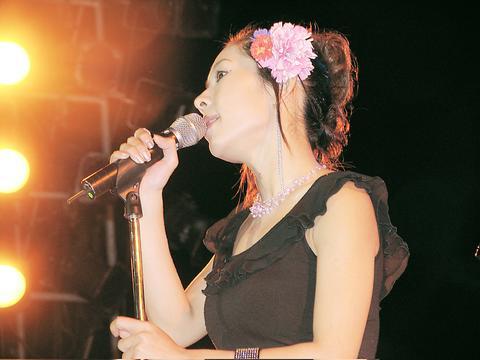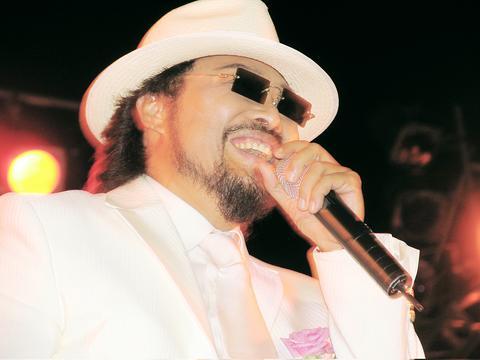Dressed like a spiv in an all-white suit with a matching hat and rectangular shades, Zhang Fei (
Though he was upstaged musically by Japan's Akiko, Zhang flattered and charmed his way through a one-hour set at People's Park (市民廣場) in Taichung on Saturday for a crowd estimated by organizers to number 100,000, but was in reality less than half of that.

PHOTO: JULES QUARTLY, TAIPEI TIMES
His decision to rely on repartee was a good one as singing was clearly not his forte. While he did no serious damage to the six songs he did cover off his album When I Fall in Love, further exposure of his vocal talents without the aid of studio help would have been pushing it.

PHOTO: JULES QUARTLY, TAIPEI TIMES
Opening with karaoke favorite Strangers in the Night, Zhang did a fairly good impression of Frank Sinatra and was clearly buoyed by the crowd's generous reception of the song. There was genuine warmth on a clear, cool but pleasant evening.
After breaking the ice, Zhang "rapped" with the compere of the show for five to 10 minutes, before launching into his next song, Around the World. This set a pattern of
alternatively crooning and sweet-talking the audience. It was courtship.
Zhang joked about his actress friends who, he said, had come to see his show but were staying at different first-class hotels in the city, so he could visit them afterward without being caught out. He said his only regret about performing was that the live televised performance would draw regular viewers of his primetime Saturday night program (on at the same time on another channel).
(I Believe) When I Fall in Love was his big song of the night and though it didn't come close to sending shivers up the spine, it was a solid reworking of the old Sinatra classic. A 15-piece backing band and mini orchestra smoothed over the cracks in Zhang's vocal range.
Nat King Cole's Misty and Walking my Baby were performed without a hitch and Volare provided the big ending. Zhang even cajoled the audience into singing along with him during the main refrains.
Overall it was a creditable performance that won over the converted and probably made a few new friends.
Zhang said he had sold 80,000 copies of his album and said this had pleased him, as he had promised before the LP's release to wear a thong in public if he sold over 100,000. He told the crowd he used to entertain in Taichung pubs at the start of his career, so to headline at the city's jazz festival was like a hero's return, he said.
After Zhang, however, the audience was treated to the real thing: a one-and-half hour concert from Japanese songbird Akiko and her jazz band. She took a while to warm up as the sound levels were out of sync and and there was some annoying feedback. After these problems were eliminated, however, she seemed to find her voice.
And what a sweet voice it was. Different in range and tone from black US artists like Bessie Smith and Dinah Washington, or even white jazz singers such as Diana Krall, Akiko was at her best singing her own compositions, which were thoughtfully constructed and tender in delivery. She scat-sang, soared and hit every note.
The talented, young singer debuted with Girl Talk in 2001 and has since released five well-received albums. On Saturday, she sang a couple of Duke Ellington classics, got into a groove with a few rhythm 'n' blues-tinged numbers and lulled everyone into mellow appreciation with the slower songs.
Douglas Habecker, the editor-in-chief of Compass magazine in Taichung, said the jazz festival was a success because it combined popular and specialized entertainment.
"It was a good combination, Zhang Fei brought it home for the local crowd and the foreign performers provided more of an education. Last year, it was more of a pure jazz experience, this year there is more of a local twist," Habecker said.
This coming weekend, there will be more free jazz, with The New Decision and Metamorphosis Jazztet in the afternoon. The evening concert on Saturday in People's Park will feature Round Midnight and the outstanding Japanese jazz pianist Takashi Matsunaga.
On Sunday, Semiscon, the Japanese Jazz Quartet and some jam sessions on Jinguo Boulevard will be the major attractions. See www.fallinjazz.com.tw for more details.

We lay transfixed under our blankets as the silhouettes of manta rays temporarily eclipsed the moon above us, and flickers of shadow at our feet revealed smaller fish darting in and out of the shelter of the sunken ship. Unwilling to close our eyes against this magnificent spectacle, we continued to watch, oohing and aahing, until the darkness and the exhaustion of the day’s events finally caught up with us and we fell into a deep slumber. Falling asleep under 1.5 million gallons of seawater in relative comfort was undoubtedly the highlight of the weekend, but the rest of the tour

Youngdoung Tenzin is living history of modern Tibet. The Chinese government on Dec. 22 last year sanctioned him along with 19 other Canadians who were associated with the Canada Tibet Committee and the Uighur Rights Advocacy Project. A former political chair of the Canadian Tibetan Association of Ontario and community outreach manager for the Canada Tibet Committee, he is now a lecturer and researcher in Environmental Chemistry at the University of Toronto. “I was born into a nomadic Tibetan family in Tibet,” he says. “I came to India in 1999, when I was 11. I even met [His Holiness] the 14th the Dalai

Following the rollercoaster ride of 2025, next year is already shaping up to be dramatic. The ongoing constitutional crises and the nine-in-one local elections are already dominating the landscape. The constitutional crises are the ones to lose sleep over. Though much business is still being conducted, crucial items such as next year’s budget, civil servant pensions and the proposed eight-year NT$1.25 trillion (approx US$40 billion) special defense budget are still being contested. There are, however, two glimmers of hope. One is that the legally contested move by five of the eight grand justices on the Constitutional Court’s ad hoc move

Stepping off the busy through-road at Yongan Market Station, lights flashing, horns honking, I turn down a small side street and into the warm embrace of my favorite hole-in-the-wall gem, the Hoi An Banh Mi shop (越南會安麵包), red flags and yellow lanterns waving outside. “Little sister, we were wondering where you’ve been, we haven’t seen you in ages!” the owners call out with a smile. It’s been seven days. The restaurant is run by Huang Jin-chuan (黃錦泉), who is married to a local, and her little sister Eva, who helps out on weekends, having also moved to New Taipei